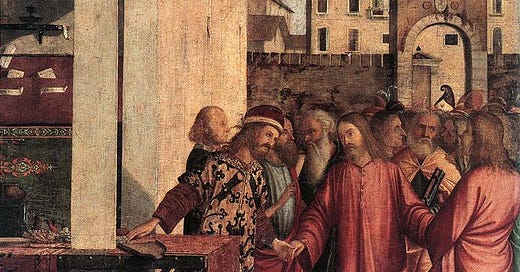The call of friendship
Following a call to friendship might lead you far from home—or somewhere even more frightening.
As Jesus went on from there, he saw a man named Matthew sitting at the tax collector’s booth. “Follow me,” he told him, and Matthew got up and followed him.
While Jesus was having dinner at Matthew’s house, many tax collectors and sinners came and ate with him and his disciples. When the Pharisees saw this, they asked his disciples, “Why does your teacher eat with tax collectors and sinners?”
On hearing this, Jesus said, “It is not the healthy who need a doctor, but the sick. But go and learn what this means: ‘I desire mercy, not sacrifice.’ For I have not come to call the righteous, but sinners.”
~Matthew 9:9–13
We don’t know where friendship will lead us. It took me a long time to be ok with this. I was extremely shy as a boy, and reluctant to open up to sharing myself with others. I didn’t know what the cost would be, whether I might be found inadequate, dull, not worth the time.
But we’re all called to friendship; it’s an essential part of living a fully human life. And friendship requires opening up. You can’t be a friend without the risk this entails.
What does it mean that friendship is a calling?
When I was growing up, we typically used the word “calling” in very dramatic terms: you were “called” to be a pastor, “called” to be a missionary in a distant country.
And in the Gospels, sometimes Jesus’s calling is this dramatic. For instance:
Jesus said to him, “If you want to be perfect, go, sell what you have and give to the poor, and you will have treasure in heaven; and come, follow Me.”
For many people, this idea of calling is exciting: an excuse to leave behind confining or stressful families, to get out of small, constricting towns, to find yourself somewhere where you’re utterly unknown and anonymous.
But not all callings are like that.
There’s an even harder path—the path that Jesus calls Matthew to. This path leads you right back to where you started.
Jesus calls Matthew. And Matthew follows him. Where to? Right back to his own house. To his old friends. To whatever mess Matthew might have been eager to escape in the first place.
My last post focused on friendship was about what’s wrong with the five-closest-people mindset—the belief that, since you’re the sum of the five people closest to you, you should be very careful who you let into your inner circle.
Jesus’s calling of Matthew shows us another way to live:
Jesus doesn’t call Matthew to abandon his friends. He calls Matthew to a new life—a life in which Matthew is more fully himself, a better version of himself. He doesn’t call Matthew away from his life, but back into it, just in a new way.
My fears growing up were unfounded—every opportunity for friendship was an opportunity to become more fully myself, not to pretend I was someone I wasn’t.
I’d venture to suggest that Jesus’s call to you is the same: not to abandon your life, but to find it again. Not to become a fake, but to become more fully yourself. Not to abandon the world for a super-spiritual existence, but to join in the feast of friendship.





